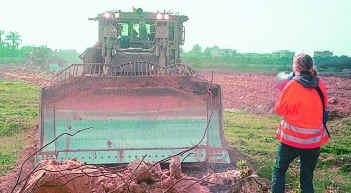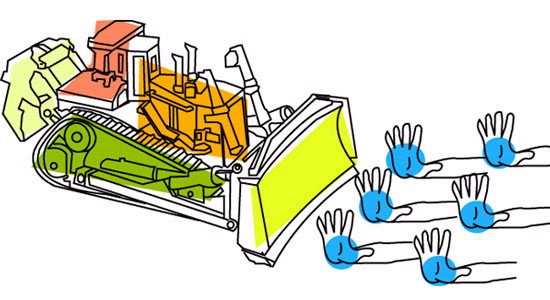From Craig and Cindy Corrie,
parents of Rachel Corrie
March 16, 2003
We are now in a period of grieving and
still finding out the details behind the death of Rachel in the Gaza
Strip. We have raised all our children to appreciate the beauty of the
global community and family and are proud that Rachel was able to live
her convictions.
Rachel was filled with love and a sense
of duty to her fellow man, wherever they lived And, she gave her life
trying to protect those that are unable to protect themselves. Rachel
wrote to us from the Gaza Strip and we would like to release to the
media her experience in her own words at this time.
Thank you.
Excerpts from an e-mail from
Rachel Corrie to her family on February 7, 2003
I have been in for two weeks and one hour
now, and I still have very few words to describe what I see. It is
most difficult for me to think about what's going on here when I sit
down to write back to the United States - something about the virtual
portal into luxury. I don't know if many of the children here have
ever existed without tank-shell holes in their walls and the towers of
an occupying army surveying them constantly from the near horizons. I
think, although I'm not entirely sure, that even the smallest of these
children understand that life is not like this everywhere. An
eight-year-old was shot and killed by an Israeli tank two days before
I got here, and many of the children murmur his name to me, "Ali" - or
point at the posters of him on the walls. The children also love to
get me to practice my limited Arabic by asking me "Kaif Sharon?" "Kaif
Bush?" and they laugh when I say "Bush Majnoon" "Sharon Majnoon" back
in my limited Arabic. (How is Sharon? How is Bush? Bush is crazy.
Sharon is crazy.) Of course this isn't quite what I believe, and some
of the adults who have the English correct me: Bush mish Majnoon...
Bush is a businessman. Today I tried to learn to say "Bush is a tool",
but I don't think it translated quite right. But anyway, there are
eight-year-olds here much more aware of the workings of the global
power structure than I was just a few years ago - at least regarding
Israel.
Nevertheless, I think about the fact that
no amount of reading, attendance at conferences, documentary viewing
and word of mouth could have prepared me for the reality of the
situation here. You just can't imagine it unless you see it, and even
then you are always well aware that your experience is not at all the
reality: what with the difficulties the Israeli Army would face if
they shot an unarmed US citizen, and with the fact that I have money
to buy water when the army destroys wells, and, of course, the fact
that I have the option of leaving. Nobody in my family has been shot,
driving in their car, by a rocket launcher from a tower at the end of
a major street in my hometown; I have a home. Ostensibly it is still
quite difficult for me to be held for months or years on end without a
trial (this because I am a white US citizen, as opposed to so many
others). When I leave for school or work I can be relatively certain
that there will not be a heavily armed soldier waiting half way
between Mud Bay and downtown Olympia at a checkpoint -a soldier with
the power to decide whether I can go about my business, and whether I
can get home again when I'm done So, if I feel outrage at arriving and
entering briefly and incompletely into the world in which these
children exist, I wonder conversely about how it would be for them to
arrive in my world.
They know that children in the United
States don't usually have their parents shot and they know they
sometimes get to see the ocean. But once you have seen the ocean and
lived in a silent place, where water is taken for granted and not
stolen in the night by bulldozers, and once you have spent an evening
when you haven't wondered if the walls of your home might suddenly
fall inward waking you from your sleep, and once you've met people who
have never lost anyone - once you have experienced the reality of a
world that isn't surrounded by murderous towers, tanks, armed
"settlements" and now a giant metal wall, I wonder if you can forgive
the world for all the years of your childhood spent existing - just
existing - in resistance to the constant stranglehold of the world's
fourth largest military - backed by the world's only superpower-in its
attempt to erase you from your home. That is something I wonder about
these children. I wonder what would happen if they really knew.
As an afterthought to all this rambling,
I am in Rafah, a city of about 140,000 people, approximately 60
percent of whom are refugees - many of whom are twice or three times
refugees. Rafah existed prior to 1948, but most of the people here
are themselves or are descendants of people who were relocated here
from their homes in historic Palestine - now Israel Rafah was split in
half when the Sinai returned to Egypt Currently, the Israeli army is
building a fourteen-meter-high wall between Rafah in Palestine and the
border, carving a no-man's land from the houses along the border; Six
hundred and two homes have been completely bulldozed according to the Rafah Popular Refugee Committee. The number of homes that have been
partially destroyed is greater.
Today as I walked on top of the rubble
where homes once stood, Egyptian soldiers called to me from the other
side of the border, "Go! Go!" because a tank was coming Followed by
waving and "what's your name?" There is something disturbing about
this friendly curiosity. It reminded me of how much, to some degree,
we are all kids curious about other kids: Egyptian kids shouting at
strange women wandering into the path of tanks. Palestinian kids shot
from the tanks when they peak out from behind walls to see what's
going on International kids standing in front of tanks with banners.
Israeli kids in the tanks anonymously, occasionally shouting - and
also occasionally waving - many forced to be here, many just
aggressive, shooting into the houses as we wander away. In addition to
the constant presence of tanks along the border and in the western
region between Rafah and settlements along the coast, there are more
IDF towers here than I can count - along the horizon, at the end of
streets. Some just army green metal. Others these strange spiral
staircases draped in some kind of netting to make the activity within
anonymous. Some hidden, just beneath the horizon of buildings. A new
one went up the other day in the time it took us to do laundry and to
cross town twice to hang banners Despite the fact that some of the
areas nearest the border are the original Rafah with families who have
lived on this land for at least a century, only the 1948 camps in the
center of the city are Palestinian controlled areas under Oslo But as
far as I can tell, there are few if any places that are not within the
sights of some tower or another. Certainly there is no place
invulnerable to apache helicopters or to the cameras of invisible
drones we hear buzzing over the city for hours at a time.
I've been having trouble accessing news
about the outside world here, but I hear an escalation of war on Iraq
is inevitable. There is a great deal of concern here about the
"reoccupation of Gaza." Gaza is reoccupied every day to various
extents, but I think the fear is that the tanks will enter all the
streets and remain here, instead of entering some of the streets and
then withdrawing after some hours or days to observe and shoot from
the edges of the communities. If people aren't already thinking about
the consequences of this war for the people of the entire region then
I hope they will start. I also hope you'll come here. We've been
wavering between five and six internationals. The neighborhoods that
have asked us for some form of presence are Yibna, Tel El Sultan, Hi
Salam, Brazil, Block J, Zorob, and Block O. There is also need for
constant night-time presence at a well on the outskirts of since the
Israeli army destroyed the two largest wells. According to the
municipal water office the wells destroyed last week provided half of
Rafah's water supply. Many of the communities have requested
internationals to be present at night to attempt to shield houses from
further demolition. After about ten p.m. it is very difficult to move
at night because the Israeli army treats anyone in the streets as
resistance and shoots at them. So clearly we are too few. I continue
to believe that my home, Olympia, could gain a lot and offer a lot by
deciding to make a commitment to Rafah in the form of a
sister-community relationship. Some teachers and children's groups
have expressed interest in e-mail exchanges, but this is only the tip
of the iceberg of solidarity work that might be done. Many people want
their voices to be heard, and I think we need to use some of our
privilege as internationals to get those voices heard directly in the
US, rather than through the filter of well-meaning internationals such
as myself. I am just beginning to learn, from what I expect to be a
very intense tutelage, about the ability of people to organize against
all odds, and to resist against all odds. Thanks for the news I've
been getting from friends in the US. I just read a report-back from a
friend who organized a peace group in Shelton, Washington, and was
able to be part of a delegation to the large January 18th protest in
Washington. People here watch the media, and they told me again today
that there have been large protests in the United States and "problems
for the government" in the UK. So thanks for allowing me to not feel
like a complete Pollyanna when I tentatively tell people here that many
people in the United States do not support the policies of our
government, and that we are learning from global examples how to
resist.


